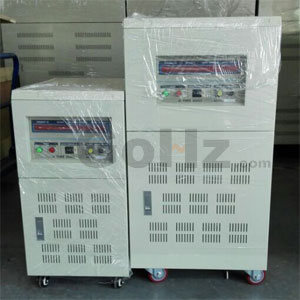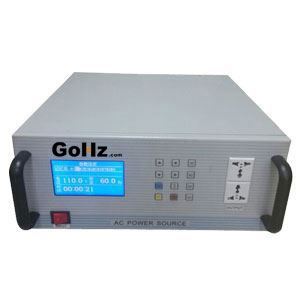Tag:
50Hz vs 60Hz
There is no "best" frequency or voltage. Everything requires some trade-off in performance or manufacturability.
In historically 50 Hz and 60 Hz is relatively same than low frequency 25 Hz or high frequency 133 Hz was appear and in operate. If you have Japan reference, there are use 50 Hz and 60 Hz power supplies with HVDC back To back. In electronic developing, specially some applications use until 400 Hz, see on electrical system Of aircraft and marine.
60 Hz machines tend to operate at slightly higher speeds - or have a slightly more complex mechanical arrangement (more poles) compared to 50 Hz equipment. Is that better or worse? Depends on what is being weighed in the equation.

In historically 50 Hz and 60 Hz is relatively same than low frequency 25 Hz or high frequency 133 Hz was appear and in operate. If you have Japan reference, there are use 50 Hz and 60 Hz power supplies with HVDC back To back. In electronic developing, specially some applications use until 400 Hz, see on electrical system Of aircraft and marine.
60 Hz machines tend to operate at slightly higher speeds - or have a slightly more complex mechanical arrangement (more poles) compared to 50 Hz equipment. Is that better or worse? Depends on what is being weighed in the equation.
Tags: 50Hz vs 60Hz
50Hz was standardized and used first for land based systems but marine generators were standardized on 60Hz. I have never read 'actually why' there was a chosen difference but at 60Hz your alternator is a little smaller and lighter. Today, even in 50Hz territories, you will find ship-to-shore and shore-to-ship 50/60Hz converters in harbors and all ships are 60Hz even European ones. You can extend the same argument to aircraft and airport ground-power supplies - those are 400Hz (441Hz to be pedantic). This means that generators for aircraft auxiliary power loads are very small and light (useful for flying!). That also explains why early data-centers were 441Hz - IBM designed to aircraft technology, even in 60Hz land. I can only assume that the US followed ships rather than England!
These standards for the 50Hz/60Hz frequency have been established when they have tested on carbon lamps. The idea was that the lamp must not flick. Indeed it was the flicker that decided the standard of the frequency in Germany 50Hz and in USA 60Hz. It seems that the lamp in Germany was smaller (therefore, the flicking phenomena was slower due to the slower temperature dissipation inside the lamp). Therefore, they have chosen 50 Hz.
These standards for the 50Hz/60Hz frequency have been established when they have tested on carbon lamps. The idea was that the lamp must not flick. Indeed it was the flicker that decided the standard of the frequency in Germany 50Hz and in USA 60Hz. It seems that the lamp in Germany was smaller (therefore, the flicking phenomena was slower due to the slower temperature dissipation inside the lamp). Therefore, they have chosen 50 Hz.
Tags: 50Hz vs 60Hz
 Often the European motors at 1hp size are universal for 50Hz or 60Hz power supply, as long as you have 400V x 50Hz and 460V x 60Hz. This is because the voltage curve from 0V x 0Hz is much the same power line through 400 x 50Hz on its way to 460V x 60Hz, so the motor is still fluxed correctly. At 60Hz power source it will usually be capable of increased power, but you will need to refer to the manufacturer's data to confirm this, and how many poles and who is the manufacturer.
Often the European motors at 1hp size are universal for 50Hz or 60Hz power supply, as long as you have 400V x 50Hz and 460V x 60Hz. This is because the voltage curve from 0V x 0Hz is much the same power line through 400 x 50Hz on its way to 460V x 60Hz, so the motor is still fluxed correctly. At 60Hz power source it will usually be capable of increased power, but you will need to refer to the manufacturer's data to confirm this, and how many poles and who is the manufacturer. Another point touched on here, is the pump. Is this a European pump, or are you retrofitting the motor? If the motor and Pump are made for use on 50Hz power supply, then there will be much more power demanded by the load. This is because at 60Hz speed will increase by 20% and absorbed kW follows the 'Cube' of speed (given that nothing else changes).
Tags: 50Hz vs 60Hz
You can use 50Hz instead of 60Hz, here in my country the frequency is 60Hz and is very common that IEC (50Hz) motors work here without troubles. IEC motor frequency has been made oversize so the flux, warm or other factors in DOL will not be affected. Probably for a smaller motor it's yes. A larger one might not be able to handle the mechanical and electrical stresses at 60Hz.
You must consider the additional speed and make sure you do not exceed the HP/current rating. With a variable torque pump the load could go up by as much as 72% (60/50^3) rpm will change, for example at 60 Hertz will produce 3600 rpm,1800 rpm, 1200 rpm, 900 rpm. The number of poles is always in pairs. at 50 hertz, 3000 rpm, 1500 rpm, so on.
You must consider the additional speed and make sure you do not exceed the HP/current rating. With a variable torque pump the load could go up by as much as 72% (60/50^3) rpm will change, for example at 60 Hertz will produce 3600 rpm,1800 rpm, 1200 rpm, 900 rpm. The number of poles is always in pairs. at 50 hertz, 3000 rpm, 1500 rpm, so on.
Tags: 50Hz vs 60Hz
Practically the result of this is that the transformer will run cooler on a 60 Hz system AT THE SAME VOLTAGE. Given the eddy-current and skin effects - even with these, it is highly unlikely that any 50 Hz transformer will not operate at rated load or higher on a 60 Hz power supply system at the same voltage levels.
Obviously the reverse does not apply because the 60 Hz (designed) transformer - assuming it has 1.5 T flux density for rated voltage - will end up at 60/50 x 1.8 T when connected to the same system voltage but at 50 Hz. This will cause many a modern (fully rated) 60 Hz transformer to overheat, due to the saturation of the core.
Obviously the reverse does not apply because the 60 Hz (designed) transformer - assuming it has 1.5 T flux density for rated voltage - will end up at 60/50 x 1.8 T when connected to the same system voltage but at 50 Hz. This will cause many a modern (fully rated) 60 Hz transformer to overheat, due to the saturation of the core.
Tags: 50Hz vs 60Hz
50Hz 60Hz Frequency Converter Setting
Using GoHz frequency converter to
Or customize your own converters.
- Convert 220v 50Hz to 110v 60Hz,
- Convert 120v 60Hz to 230v 50Hz,
- Convert 110v 60Hz to 240v 50Hz,
- Convert 480v 60Hz to 380v 50Hz,
- Convert 400v 50Hz to 460v 60Hz,
- Convert 240v 60Hz to 380v 50Hz,
Or customize your own converters.
Featured Articles
460v 60Hz motor on 400v 50Hz power ...
 Often the European motors at 1hp size are universal for 50Hz or 60Hz power supply, as long as you have 400V x 50Hz and 460V x ...
Often the European motors at 1hp size are universal for 50Hz or 60Hz power supply, as long as you have 400V x 50Hz and 460V x ...
 Often the European motors at 1hp size are universal for 50Hz or 60Hz power supply, as long as you have 400V x 50Hz and 460V x ...
Often the European motors at 1hp size are universal for 50Hz or 60Hz power supply, as long as you have 400V x 50Hz and 460V x ...Convert 220v, 230v, 240v 50Hz to 110v, ...
 When you buy an 110v (120v) 60Hz appliance from USA, and run it on 220v (230v, 240v) 50Hz country (i.e. UK, Australia, ...
When you buy an 110v (120v) 60Hz appliance from USA, and run it on 220v (230v, 240v) 50Hz country (i.e. UK, Australia, ...
 When you buy an 110v (120v) 60Hz appliance from USA, and run it on 220v (230v, 240v) 50Hz country (i.e. UK, Australia, ...
When you buy an 110v (120v) 60Hz appliance from USA, and run it on 220v (230v, 240v) 50Hz country (i.e. UK, Australia, ...60Hz motor running on 50Hz power ...
 Electric motors, both single and three phase, are designed for running on a specified power frequency. But sometimes we may use a ...
Electric motors, both single and three phase, are designed for running on a specified power frequency. But sometimes we may use a ...
 Electric motors, both single and three phase, are designed for running on a specified power frequency. But sometimes we may use a ...
Electric motors, both single and three phase, are designed for running on a specified power frequency. But sometimes we may use a ...